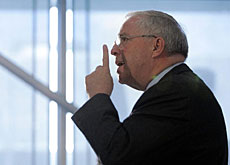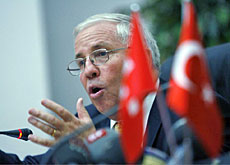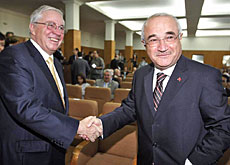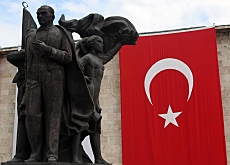Blocher insists on revised anti-racism law

Swiss Justice Minister Christoph Blocher says he is intent on revising Switzerland's anti-racism law, confirming comments he made in Turkey earlier this week.
Blocher’s original remarks, made in Ankara, caused an uproar in Switzerland among politicians and the media. The cabinet is to discuss the minister’s statement soon.
Speaking in Zurich on Friday, Blocher said he was surprised by the criticism he faced back home after making his comments. He added that what bothered him in the legislation was the “tense relationship” between freedom of speech and anti-racism legislation.
Freedom of expression was essential to democracy, affirmed the minister. “I want people to be able to express themselves in Switzerland, even if their opinion doesn’t appeal to everyone,” he added.
During his trip to Turkey, Blocher had remarked that part of the anti-racism law – adopted in 1994 and including sections aimed at preventing revisionist views about the Holocaust – gave him a “headache”.
The law has led to investigations against two Turks, including a historian, in Switzerland for allegedly denying the 1915 Armenian massacre.
Blocher said a working group at his ministry was re-examining the law, in particular article 261bis, adding that it was up to the government, parliament and possibly the population, to decide on any changes.
Blocher said on Friday that he had not many any promises to the Turkish government on the matter.
Armenians say around 1.8 million of their people were killed in the massacre. Turkey disputes this, putting the figure closer to 200,000. Under Swiss law any act of denying, belittling or justifying genocide is a violation of the country’s anti-racism legislation.
Storm of protest
Blocher’s comments unleashed a storm of protest in Switzerland. On Thursday Interior Minister Pascal Couchepin said that the justice minister’s remarks were “unacceptable”.
For his part, President Moritz Leuenberger said he was surprised, adding that the cabinet would discuss the issues arising from Blocher’s comments.
Three of the main political parties in government have also condemned the remarks. Blocher’s own rightwing Swiss People’s Party has so far declined to comment.
However, the House of Representatives, which has just ended its autumn parliamentary session, has decided against debating on the issue.
Several political commentators have called the comments provocative and have questioned whether the anti-racism law, voted on by the population, could be changed.
Marcel Niggli, professor of law of Fribourg University, told swissinfo that it was strange that Blocher should have made the remarks during a trip abroad and that he should have defended and not criticised the law.
Blocher said that on the whole the trip has been positive and that his Turkish counterpart Cemil Cicek had assured him that he was ready to create a commission made up of historians from different countries that would have access to Turkish and Armenian archives.
swissinfo with agencies
Swiss anti-racism legislation was adopted in 1994, among other things to prevent revisionist views about the Holocaust.
In 2005, Swiss authorities launched criminal investigations against the historian Yusuf Halacoglu, the president of the Turkish History Organisation, and the politician Dogu Perinçek for allegedly making comments in Switzerland denying the 1915 Armenian massacre.
Armenians say around 1.8 million of their people were killed. Turkey disputes this, putting the figure closer to 200,000.
Under Swiss law any act of denying, belittling or justifying genocide is a violation of the country’s anti-racism legislation.
Long-standing relations between Switzerland and Turkey have recently been strained. 2005 was an “annus horribilis”:
In March 2005 Swiss Foreign Minister Micheline Calmy-Rey visited Turkey and raised the sensitive issue of the massacre of Armenians in Turkey early last century.
In June the Swiss public prosecutor launched a criminal investigation against a Turkish historian in Switzerland who had denied the genocide, a violation of Switzerland’s anti-racism laws.
In July Turkey’s foreign minister, Abdullah Gül, described the Swiss investigation as “unacceptable” and “absolutely contrary to the principle of free speech”.
In August the Turkish authorities postponed a visit by Swiss Economics Minister Joseph Deiss citing agenda problems of his Turkish counterpart.
In November Switzerland beat Turkey in a vital World Cup playoff match, triggering ugly scenes between players.

In compliance with the JTI standards
More: SWI swissinfo.ch certified by the Journalism Trust Initiative



You can find an overview of ongoing debates with our journalists here . Please join us!
If you want to start a conversation about a topic raised in this article or want to report factual errors, email us at english@swissinfo.ch.